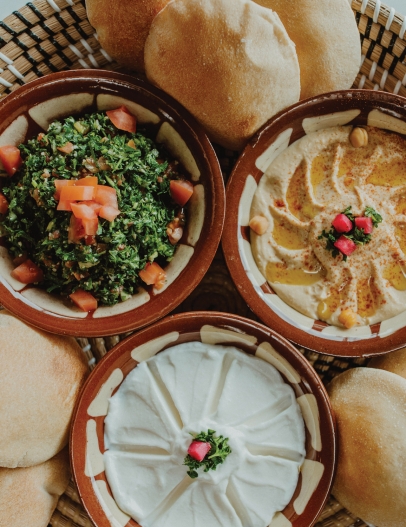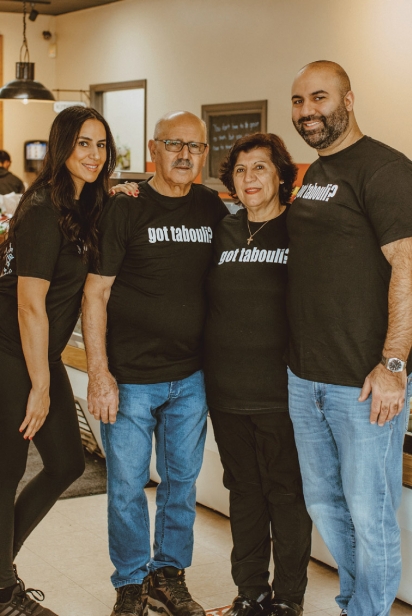Beirut Bakery
FOR DETROITERS LONGING for a taste of traditional Lebanese food, Beirut Bakery in Redford is a must-stop destination. For over 40 years, the Hallis family has been delighting local customers with the distinctive flavors of the Middle East and the family recipes they were raised on.
The results of those recipes evoke happy memories for many customers, especially those who immigrated from Lebanon and nearby countries.
“We often hear that our food tastes just like Grandma’s: It tastes like home,” says Catherine Hallis, who is a next-generation owner alongside her brother, Mark Hallis.
“It reminds people of a time when maybe things were simpler,” says Mark. The two grew up watching their parents, aunts and uncles working together, building the business to sustain the family and share their culture with the community, he says, adding that their dedication and passion are what made the business so successful.
Their uncle, Alex Wakim, founded the business in 1979, when he and his family immigrated to the United States during Lebanon’s civil war. Seeking a new beginning, he followed in the footsteps of another uncle who was living in Michigan, working at Ford Motor Co. in Dearborn. The family settled in Redford and opened Beirut Bakery on Schoolcraft Road, featuring homemade bread, including pita breads and lavash. It was the first Middle Eastern shop in Wayne County.
It wasn’t long before they had a loyal following. In the 1980s it was common for customers to stop by early in the morning on their way home from the night shift at an area auto plant to buy bread from the back door.
In time, several local grocers inquired about purchasing their bread so Beirut Bakery began to sell it wholesale to stores throughout Metro Detroit. One of their first customers was Merchant of Vino, the fabled Detroit-area wine and food markets.
“We found little accounts all over Detroit, dropping off bread,” says Catherine. “We would bake all night, then during the daytime send it out to a variety of stores. Dad was delivery driver. Eventually, Merchant of Vino asked if they could purchase some of our traditional Lebanese foods, like hummus and tabouli. That’s when the deli items came in. One of my aunts took on that role, making large quantities of those items to sell wholesale.”
As demand increased for the food, they pivoted from wholesaling bread to wholesaling salads and dips. They purchased the adjoining section of the building they were in, knocked down a wall, built a new kitchen and expanded the retail store for walk-in customers, offering tabouli, fattoush, chickpea salad, yogurt salad, lentil salad, hummus and garlic dip, baba ghanouj, grape leaves, soups, shawarma, pita bread and spinach and feta pies.
In 1997, Merchant of Vino was purchased by Whole Foods and a new level of opportunity opened up for the family. Catherine and Mark Hallis began taking on a greater role in the business in 2007 and by 2015, Whole Foods asked if they could increase production to supply stores in the Chicagoland area and, recently, stores throughout the Midwest.
“Transitioning to that level of production was challenging for the family on many levels,” says Mark. “We bought another adjacent building and new equipment, and we had to go through a lot of changes to produce food in the most efficient and safest manner, while keeping our standards of quality and integrity…. It was a learning experience for the entire family. We actually had to write down recipes for the first time.”
“We were used to doing things a certain way, but we had to relearn everything that we knew after 30-plus years,” says Catherine. “We had to teach a new way of life.”
“It was also about passing the torch,” says Mark. “Cathy and I had to learn how to run the family business, so we could move on to the next phase. It was a defining moment in the business.”
Before the expansion, the bakery had 10 employees making 10,000 pounds of hummus annually. Today, 28 employees make 100,000 pounds of hummus and 90,000 pounds of tabouli per year. Despite such huge growth in the wholesale part of the business, it has always been a priority for the retail store to retain the homestyle feel of the original business.
“Mom still carries that on today,” says Mark. “Out of everything, we didn’t want to lose the culture of what the business is: our family and their contribution to what it has become today. Dad is over the moon to see how we’ve grown. They are both so thankful and happy.”
The family legacy—based on the standard set by their parents to create comforting, signature dishes—shines through in their food.
“We try to follow a model of having a nice balance of flavors, using the best ingredients we can find. Lebanese food is a mix of cultures,” says Mark. “Beirut is a port city, with traders passing in and out in a constant mix of cultures—Roman, Greek, French, European—and the food reflects that. Spinach pies are typically a Greek dish, but the Lebanese have their own spin on it with a French vegetable medley inside. People really like it.”
They’ve seen both good and challenging times in the local community, and the family has experienced the same things right alongside their customers, some who have been coming in for decades. “We’ve had plenty of times when customers had to talk and cry with us about what was going on around us,” he adds.
“There are customers that I’ve seen walk in here my whole life,” says Catherine. “Our community is everything. We would not be here without them. Detroit is a melting pot of cultures. So many people migrated here from all over—Italy, Poland, Lebanon— to work for Ford. How lucky for us to be able to serve these people from all around the world. They are the air to our fire.”
Beirut Bakery 25706 Schoolcraft Rd., Redford 313-533-4422 | beirutbakery.net






